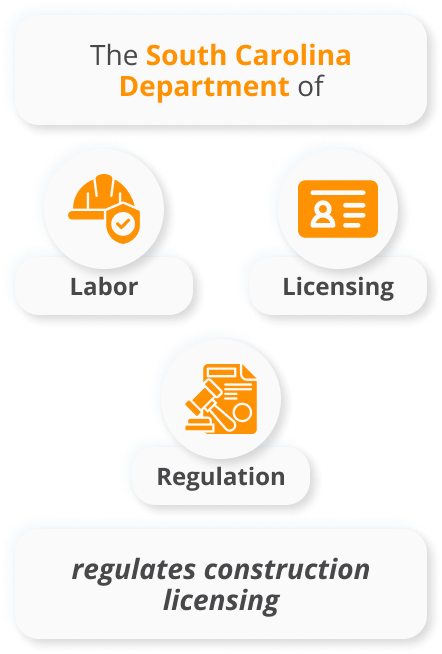Constructing Careers: The Essential Roadmap to Contractor Licensing in South Carolina!
If you are interested in undertaking commercial construction projects in South Carolina, it is crucial to obtain a General and Mechanical Contractors License. However, the licensing process can be complicated, and it is easy to get lost in the requirements and procedures that govern the construction industry in the state. To help you navigate this process with ease, we have created a comprehensive guide that will walk you through all the nuances of obtaining a contractor’s license in South Carolina.
South Carolina Contractor’s Licensing Board (SCLB)
Contact Information:
Web: South Carolina Contractor’s Licensing Board
Alternate Phone Number: 512-463-6599 (For calls outside Texas)
Alternate Phone Number: 512-463-6599 (For calls outside Texas)
Phone: (803) 896-4686
Alternate Phone Number: 512-463-6599 (For calls outside Texas)
Alternate Phone Number: 512-463-6599 (For calls outside Texas)
Address:
Main Office: 110 Centerview Drive, Columbia, SC 29210
For more information, visit: South Carolina Contractor’s Licensing Board
The Role of the South Carolina Department of Labor, Licensing and Regulation
The South Carolina Department of Labor, Licensing and Regulation is pivotal in the licensing process. As the governing body, it sets the standards, administers the exams, and oversees contractors’ compliance with state regulations. This department is not just a regulatory authority but also a resource for aspiring and current contractors, providing guidance and information essential for navigating the complexities of the construction industry. Its oversight ensures that the construction projects undertaken in South Carolina meet the highest safety, quality, and efficiency standards.

Eligibility and Examination Requirements for Licensing
Experience Criteria: Demonstrating Two Years of Experience
In South Carolina, one of the key eligibility criteria for obtaining a General and Mechanical Contractors License is demonstrating a sufficient level of practical experience. This requirement ensures that contractors have a foundational understanding of the construction industry and are prepared to handle the complexities of commercial projects.

Examination Requirements: Trade Exam and Business & Law Exam
- Qualifying Experience: Applicants must show proof of at least two years of relevant experience in the construction industry within the last five years. This experience should be directly related to the type of work the contractor plans to undertake and can include a range of construction-related roles.
- Documentation of Experience: It’s essential to provide detailed documentation of this experience, which could include employment records, references from previous employers or clients, and descriptions of completed projects.
- Assessment of Experience: The South Carolina Department of Labor, Licensing and Regulation will assess the provided experience to determine if it meets the state’s standards for licensing.
Passing the required examinations is another crucial step in the licensing process. These exams test an applicant’s technical knowledge and understanding of business and legal aspects related to the construction industry.
- Trade Exam: The trade exam covers specific technical and trade practices relevant to general contracting. It assesses the applicant’s expertise in construction methods, materials, tools, and safety protocols.
- Business and Law Exam: This exam focuses on the business and legal aspects of running a contracting business. Topics include project management, labor laws, financial management, and understanding of state-specific construction laws and regulations.
- Preparation and Scheduling: Candidates are advised to thoroughly prepare for these exams, utilizing study guides and preparatory courses if necessary. The exams can be scheduled through the South Carolina Department of Labor, Licensing and Regulation, with information about dates, locations, and fees available on their website.
Group Classifications for General Contractors in South Carolina
Classification Overview: Group 1 to Group 5 Contractors
In South Carolina, general contractors are classified into five distinct groups based on the financial scale of the projects they are eligible to undertake. This classification system ensures that contractors are matched with projects appropriate to their experience level and financial capacity.
Group 1 Contractors
- Project Cost Limit: Eligible to work on projects costing $50,000 or less.
- Target Projects: Ideal for smaller-scale or residential projects.
Group 2 Contractors
- Project Cost Limit: Can undertake projects up to $200,000.
- Scope: Suited for medium-sized projects, including residential and some commercial work.
Group 3 Contractors
- Project Cost Limit: Eligible for projects costing up to $500,000.
- Range: Encompasses larger residential projects and medium-scale commercial constructions.
Group 4 Contractors
- Project Cost Limit: Can work on projects up to $1,500,000.
- Application: Suitable for substantial commercial projects and complex residential developments.
Group 5 Contractors
- Project Cost Limit: Eligible for projects of any cost, with no upper limit.
- Capability: Designed for the largest and most complex projects, including major commercial and public works.
Net Worth and Surety Bond Requirements for South Carolina General Contractors
Net Worth Requirements: Varying Criteria for Different Groups
In South Carolina, general contractors are required to meet specific net worth criteria based on their group classification. This requirement is designed to ensure financial stability and capability relative to the size of the projects they undertake.
- Group 1: Net worth requirement of $10,000.
- Group 2: Net worth requirement of $40,000.
- Group 3: Net worth requirement of $100,000.
- Group 4: Net worth requirement of $175,000.
- Group 5: Net worth requirement of $250,000.
Group 1 to Group 5: Specific Net Worth Criteria
Each group has a set net worth requirement that contractors must meet or exceed to maintain their eligibility for that classification.
- Graduated Requirements: As the group number increases, so does the net worth requirement, aligning with the greater financial responsibilities associated with larger projects.
- Verification: Contractors must provide proof of their net worth, which varies by group.
Financial Statement Requirements: From Self-Prepared to Audited Statements
The type of financial statement required by contractors in South Carolina varies based on their group classification.
- Groups 1 and 2: Contractors must submit a self-prepared, notarized balance sheet.
- Groups 3 and 4: Contractors are required to submit a financial statement reviewed on a Generally Accepted Accounting Principles (GAAP) basis.
- Group 5: Contractors must provide a financial statement audited on a GAAP basis.
Surety Bond Requirements: Bond Amounts for Each Group
In lieu of meeting the net worth requirements, contractors can opt to submit a surety bond. The required bond amounts vary by group:
- Group 1: $20,000 bond.
- Group 2: $80,000 bond.
- Group 3: $200,000 bond
- Group 4: $350,000 bond.
- Group 5: $500,000 bond.
In South Carolina, contractors need:
- General Liability Insurance: $500 – $2,500 annually, depending on coverage limits.
- Workers’ Compensation Insurance: $2,000 – $7,000 annually, based on payroll and risk.
- Commercial Auto Insuranc: $1,200 – $3,500 per vehicle annually.
- Builder’s Risk Insurance: $800 – $2,000 per project.
- Professional Liability Insurance: $800 – $2,500 annually, depending on coverage.
See the Official Document:

Surety Company Expectations: Financial Statements Beyond State Requirements
When obtaining surety bonds, contractors might encounter expectations from surety companies that go beyond the state’s requirements.
- Comprehensive Financial Statements: Surety companies typically require more detailed financial statements to assess the contractor’s ability to meet project obligations.
- Assessment of Risk: This additional financial scrutiny helps the surety company determine the contractor’s risk level and financial health, which is crucial in the bonding process.
Application Process for General Contractor License in South Carolina
Step-by-Step Guide: Navigating the Licensing Application
The process of obtaining a General Contractor License in South Carolina involves several key steps. Here’s a guide to navigate through the application process:

Determine Your Classification
Based on your experience and financial capacity, decide which group classification (Group 1 to Group 5) you fit into.

Gather Experience Documentation
Compile proof of your two years of relevant experience in the construction industry within the last five years.

Prepare for Exams
Enroll in and prepare for the mandatory trade exam and the business and law exam. Schedule your exams through the designated testing agency.

Complete Education Requirements
If required for your classification, complete any mandatory education courses.

Compile Financial Documentation
Prepare the necessary financial statements or bond documents as per your group classification’s requirements.

Fill Out the Application Form
Obtain and carefully fill out the application form for the General Contractor License from the South Carolina Department of Labor, Licensing and Regulation.
Documentation and Fee Submission: What to Prepare and How to Submit
- Required Documents: Along with the application form, you will need to submit:
- Proof of experience.
- Financial statements or bond documents.
- Exam results.
- Any additional qualifications or certifications, if applicable.
- Application Fee: Check the current application fee for your specific group classification. Fees may vary based on the classification and other factors.
- Submission of Application:
- Submit the completed application form along with all the required documents and the application fee.
- This can usually be done either online through the Department’s website or by mailing the documents to their office.
- Review and Approval: After submission, your application will be reviewed by the South Carolina Department of Labor, Licensing and Regulation. This process may take several weeks. You may be contacted for additional information or clarification.
- Receive Your License: Once your application is approved and all criteria are met, you will be issued your General Contractor License, allowing you to undertake construction projects legally within your classification in South Carolina.
Frequently Asked Questions (FAQ)
These are common questions about General Contractor License in South Carolina.
YIn South Carolina, general contractors are classified into five groups based on project cost limits, ranging from Group 1, eligible for projects up to $50,000, to Group 5, eligible for projects of any cost.
TYes, for commercial construction jobs worth over $5,000 in South Carolina, contractors are required to have a General and Mechanical Contractors License.
Contractors must show proof of two years of relevant experience within the past five years and pass both a trade exam and a business and law exam.
Contractors must meet varying net worth requirements or submit a surety bond, depending on their group classification, with net worth requirements ranging from $10,000 for Group 1 to $250,000 for Group 5.
To apply, determine your group classification, gather experience documentation, prepare for and pass required exams, compile financial documents, fill out the application form, and submit it with the necessary fee to the South Carolina Department of Labor, Licensing and Regulation.

